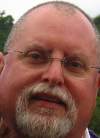 Ricardo Pau-Llosa was born in La Habana, Cuba in 1954 and, after the age of six, grew up in exile in the United States. He is the author of five books of poetry: The Mastery Impulse (Carnegie Mellon, 2003), Vereda Tropical, (Carnegie Mellon, 1999), Cuba (the 100th title in the Carnegie Mellon Poetry Series, 1993), Bread of the Imagined (Bilingual Press, 1992), and Sorting Metaphors (Anhinga Prize, 1983). His forthcoming collection, The Parable Hunter, will be published by Carnegie Mellon in 2008. Pau-Llosa has published extensively on the visual arts, particularly 20th century Latin American painting and sculpture.
Ricardo Pau-Llosa was born in La Habana, Cuba in 1954 and, after the age of six, grew up in exile in the United States. He is the author of five books of poetry: The Mastery Impulse (Carnegie Mellon, 2003), Vereda Tropical, (Carnegie Mellon, 1999), Cuba (the 100th title in the Carnegie Mellon Poetry Series, 1993), Bread of the Imagined (Bilingual Press, 1992), and Sorting Metaphors (Anhinga Prize, 1983). His forthcoming collection, The Parable Hunter, will be published by Carnegie Mellon in 2008. Pau-Llosa has published extensively on the visual arts, particularly 20th century Latin American painting and sculpture.1. Which author and/or book has most influenced you?
Aside from the classics and 'canon' writers. Influence occurs mostly in one's early maturity (college years)--so the modern writers I read with most enthusiasm at that stage and to which I return with fondness to this day (this may or may not translate into 'influence') were: Wallace Stevens, Pablo Neruda, Jorge Luis Borges, Richard Wilbur, Rainer Maria Rilke, Federico Garcia Lorca, Derek Walcott, Ted Hughes, James Dickey--these are not in any order of importance. Philosophers and historians were just as important--Empiricists, Edmund Husserl, Martin Heidegger, Paul Ricoeur, C.S. Peirce, Fernand Braudel, Frances Yates, Otto Rank, Elias Canetti, Mircea Eliade.
2. How has living and working in South Florida shaped your work?
As a Cuban-American who identifies entirely with the exile experience, I'd say it has impacted me quite a lot. Miami had, may still have, the potential to combine epic and theater, if it took consciousness of it--no theater without self-awareness of theatricality. Exile, not nostalgia, was the driving plot, for exile is a battlefield and nostalgia a tea room. Miami refuses to assume this invitation to greatness.
3. Unlike many other Cuban-American poets, your poems about Cuba are rarely nostalgic. Indeed, they sometimes seem combative. Do you agree? If so, to what do you owe this difference in tone and style?
The poet is always an advocate--in the legal sense. Sometimes you prosecute, sometimes you defend your client. But you're always arguing with images and against them.
4. “Poetry is nearer to vital truth than history.” ~Plato, Ion. How would you apply this to your work, especially to the sense of history that informs most of your work?
Never cared for Either/Or's. If truth is a city, it can be arrived at by air, sea and land. And abandoned just as easily. In fact, even easier. It is the city you can abandon and think you're still residing in it.
5. Over the years your poems have undergone a transformation from the cryptic lines in Sorting Metaphors to a looser, expansive style in The Mastery Impulse. To what do you attribute this change?
Got older, read more, wrote more, got less energy with which to struggle with the erotic obscurity of cryptic lines.
(Optional) What makes you laugh?
Reading my old poems. And they get old pretty quick, too.
***
Tags:
Miami
Caribbean writers
Poetry
poetry blog
poet blog
Cuban-American writers
Authors
South Florida writers
Caribbean literature
Ricardo Pau-Llosa
Kwame Dawes
*
Next week Friday: Kwame Dawes, author of Natural Mysticism: Towards a New Reggae Aesthetic in Caribbean Writing.
No comments:
Post a Comment